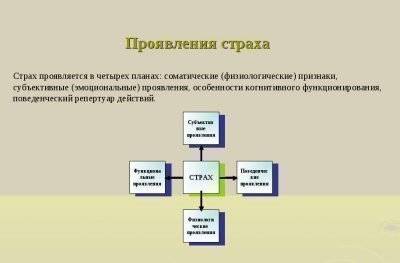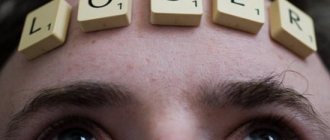Cowardice is a mental quality based on the desire to avoid possible troubles by any available, physical or mental, efforts. Cowardice manifests itself in the desire to avoid those worries and troubles that naturally, due to our imperfections, accompany our lives. First of all, this is the desire to eliminate the unpleasant attitude of other people towards oneself: their disagreement, neglect or insufficiently high assessment of our opinion.
In everyday life, it can manifest itself both in a constant desire for what is pleasant (or regret and despondency about the lack of it), and in an attempt to avoid troubles, evade them in any way, refute any indications from others about inappropriate behavior or arrangement (since recognition of its sinfulness is at the same time an admission of guilt, the presence of which fairly entails the punishment that the cowardly fears so much).
In everyday life, cowardice may not be obvious. It can be sharply expressed and manifested by visible actions (betrayal, lies, flight, leaving in trouble, etc.) most often in extreme situations. No peculiarities in facial expressions and gestures were observed in those suffering from cowardice, although quite often such people are stooped.
If cowardice does not find satisfaction, that is, a person who agrees with it does not allow himself to show it, somatization of sin may occur, leading to gastritis or gastric ulcer. Like other sins, cowardice originates from pride. The further path of its formation is as follows: self-love - self-pity (self-concern) - cowardice. Just as vanity is almost certainly accompanied by people-pleasing behavior, in the same way cowardice can be masked by ostentatious courage, cockiness, and arrogance, which have the character of a kind of overcompensation.
Depending on what troubles (or joys) are significant for a cowardly person, cowardice in its manifestations can change: be narrowly focused or, conversely, extended to almost everything around them. Naturally, in a glutton, vain or lascivious person, cowardice will take its own specific forms.
A cowardly braggart will feel cowardly at the thought of not being listened to, but will be able to easily tolerate the lack of pleasant food. A cowardly glutton will experience cowardice, fearing that he will not get food in the quantity or quality he desires, but will easily endure physical pain or lack of admiration from others, and the like.
Being, like any sin, just a denial of virtue, cowardice causes a cowardly person to first of all reject courage, selflessness and patience, as well as people who possess these qualities.
Paradoxical as it may seem, a cowardly person often creates situations in his life that may entail unpleasant consequences for him, so that, by evading and avoiding them, he can reasonably indulge his cowardice or have the everlasting opportunity to regret the presence of troubles and the absence of desired joys.
To do this, a coward (despite the obvious absurdity of such behavior) may deliberately not fulfill the promises he has made, let people down, provoking those whom he let down to desire revenge, punish or stop communicating with him. Cowardice easily leads to fearfulness, apprehension, fearfulness and timidity. A penchant for entertainment can also be a product of cowardice, because any entertainment (cinema, theater, sports) temporarily distracts a person’s attention from the unpleasant things in his life, but, as a rule, does not eliminate difficulties, but rather aggravates them.
Because, running away from problems, a cowardly person does not devote the necessary attention, time and effort to resolving unpleasant situations. Due to the fact that laughter has the ability to reduce the significance of any events and impressions and makes it easier to endure troubles, a cowardly person’s behavior may show a tendency towards ridicule, giggles and a kind of irony.
You can resist cowardice without changing your usual behavior, but by dramatically changing your attitude towards yourself, towards others and towards your responsibilities, by resorting to such qualities as prudence, caution, moderation and gradualism. Cowardice is no less successfully eradicated by courage, selflessness, patience and humility (patience should not be confused with tolerance for sin).
“It was already mentioned earlier that in the presence of superior enemy forces, especially armed ones, it is worth disappearing from the place where you are. In general, it’s better not to even go to such places - but this is understandable. However, the methods of this very disappearance have not yet been described in detail. Let's restore justice.
Strictly speaking, “disappear” in this case is equal to “run away.” That is, resort to escape. Run away.
I don't know if you've encountered situations where escape is the only option. But according to the unanimous assurance of those who encountered it (and, naturally, who shared their adventures), it is VERY DIFFICULT to escape. And first of all, because it’s a SHAME.
Strange, isn't it? Why is the way in which a person can almost easily and almost simply avoid various dangers feel shameful?
There are probably many reasons. Among which, in the author’s opinion, of course, the main one is the truth absorbed with mother’s milk:
Practical recommendations for combating fear and cowardice
The main problem in the fight against cowardice is that a person can control it only before the attack occurs. An algorithm of actions has been developed for this:
- Motivate yourself. To do this, on a piece of paper you need to write a list of those things that you are losing while you are ruled by weakness. A coward will never make his dream come true and will not be able to protect himself and his loved ones in case of danger. After this, motivation will appear. You also need to make a list of 30 points that describe what a person will gain when he overcomes panic fear.
- Study yourself and try to understand the reason for your cowardice, convince yourself that it is interfering with your life.
- Don't sit in front of the TV. An endless stream of information forces the brain to work in rush mode, which throws the nervous system out of balance. It's better to read a book or take a walk in the fresh air.
- Keep yourself busy. Remember what you love to do most. What brings you pleasure? Get busy with this.
- Model your body. This will give you confidence, raise your self-esteem, and your fears will go away on their own.
- Set yourself a goal: stop scolding yourself and hating yourself for your own cowardice. Having achieved it, move on to control your feelings. Create a personal code of courage and follow it.
The fight against cowardice is similar to training, where systematic and methodical behavior is also important. Look fear in the eye and begin a methodical fight against it.
Where is the way out, or How to get rid of cowardice
The first step should be to understand yourself correctly. At the “System-Vector Psychology” training, you can and should do this yourself. Understanding your basic fears helps you understand where they come from and how they relate to situations where we show cowardice.
The next step after realizing your nature is the correct realization of the potential of your psyche in socially useful activities, during which fear is transformed into empathy, compassion and love for people. For the owner of the visual-cutaneous ligament, these are, for example, the professions of a salesman in a women's store, an administrator in a beauty salon, an actor, and a manager. These are all necessary professions that do not require a lot of muscle mass or the ability to swing your fists. Going on stage, even at an amateur theater, is no longer an act of a coward. And customers are simply delighted with well-groomed and gallant salespeople in women's clothing or cosmetics stores!
Implementation for the anal-visual ligament is an archaeologist, historian, art historian, tailor, jeweler, artist, designer, teacher
Thorough knowledge of the subject, inexhaustible patience, attention to detail, the ability to teach others - all this is necessary and in demand in modern life
Brute physical strength is not needed in such activities and even interferes. What is needed is the ability to see beauty, respect for the experience of ancestors and traditions, the creation of emotional connections, simple human empathy, sensitivity to the needs of others, love and compassion. This is so contrary to the false attitudes that are being implanted - that you need to stand up for yourself, fight and prove something with your fists, and not try to understand and come to an agreement. Without destruction and aggression. After all, the Stone Age ended long ago.
During the visual training session, the problems of such men are worked out in great detail, and they completely get rid of numerous complexes and fears.
The changed internal state ceases to attract aggression through a state of fear. It’s like with a dog - if you’re not really afraid, it won’t even think about attacking. A similar mechanism works in humans. When a visual person reveals his nature and correctly realizes his properties, he does not experience fear, which means he does not find himself in dangerous situations.
How to feel psychological comfort and wealth? How to get rid of cowardice? Realize yourself, realize yourself, take your place in life. And for this, first come to the free online training by Yuri Burlan “System-vector psychology”
.
Proofreader: Natalya Konovalova
See also[edit]
- The enemy is strong in your fear
| [change] Death | ||
| General | Resurrection Sorting Algorithm • Mortality Sorting Algorithm • Reunite in Death • Speak Before Dying • Cheap Death • And They Died on the Same Day • Protagonist Immunity • Someone Must Die • Marks of Death • Mortido • Song of Death • Please Wake Up! • Post-mortem message • Post-mortem character • Post-mortem narrator • Dying revelation • Dying declaration of love • Religion of Death • Survivor bias • Fairytale death • Death in public • Death in the snow • Death forever vs Death is just the beginning • Death by childbirth • Death from heaven • Death went on vacation • Kill them all • Killed for real • Anyone can die • Miraculous death | |
| That light | • News from the other world • Warrior's paradise • Lots of afterlifes • The afterlife office • Afterlife angst • Afterlife Groundhog Day • The afterlife is ordinary • Afterlife court • Artificial afterlife • Lifestream • Limbo • Nirvana • Posthumous amnesia • The threshold of the next world • Adventures in Komalandia • Paradise • Death is absolute (Total destruction) • Purgatory • Chaos • Sheol | |
| They live in the next world | Archdemons and Archdevils • God of Death • Spirits • Devil • Ghost Train • Psychopomp • Shinigami • Grim Reaper • Eurydice | |
| Those who accepted death | Actor Semetsky • Anti-immortalist • Long-liver • Hero (Vasquez • mentor • man • Russians • strongman • Whorf) • Thank you for the great mercy shown! • Heroic Red Button • Thugs • Mountain of Bloody Bodies • Pet • Sacrificial Lamb • Sacrificial Goat • Sacrificial Lion • Vaporizing Corpses • Kamikazes • Red Shirts (Red Shirt Reporter) • Outlived Your Usefulness (You Have Failed Me) • Traitor • Too Good for this world... | |
| Cheating Death | Hell will not hold him • Astral projection, not a ghost • Abyss of time • Immortality (biological • defective • true • cannibal • collective • retroactive • Makropoulos remedy • Aspiring immortal • fundamental) • Came back not the same • Resurrected in the ending • Risen from the dead • Childhood invulnerability • Joker immunity • Idiot immunity • Faked death (death is the best alibi) • Execution made him cooler • Survivor's guilt complex (Why didn't you burn in the tank?) • Buy youth • I'm actually seven hundred years old • Not finished off • Unworthy death • Undead • Necromancy (necroromance) • Posthumous heroism • Stealing the soul from heaven • Rasputin's vitality (Surviving a headshot • Surviving his execution) • Reincarnation • Suicidal looking jump • More alive than dead • Death as a reward • Death vs. hell • Body like this and were not found • You are alive!/You are alive! Oh, damn... • Shifty internal organs • Died - no problem, we'll fix it • Conditionally mortal • Phylactery • Miraculous resurrection • I recovered • ... | |
| They bring death | Head Off (Head Explosion) • Klingon Promotion • Outhouse • Indirect Kill • Unconvincing Fatal Wound • Final Solution • Leave the Wounded and Sick • Buried Alive • Hit to the Heart/Heart Down! • Communication problems kill • Impale them! • Fall from a height • Deadly invitation • Deadly hysteria • Death delivered to your home • Darkness is deadly • Euthanasia (Finishing off the wounded • Mercy strike) • Hurting, and in half! Alive : Execution by Beasts • Kaishaku • Maniac • Hired Killer • Serial Killer • Bluebeard • Orphan • Love Killer • Kingslayer • Black Widow • I Killed Gwen Stacy | |
| Games with death | The bus crashed • A visit to the next world • In general, it burst • Resurrectionists • Everyone around is actually dead... • Meeting the bullets with my chest • Calling fire on myself • Gladiator • Hussar roulette • He won’t live to see the trial • If you kill him, you will like him • Talk to death • Caring before slaughter • Lighted up before death • Famous last words (incomprehensible last words) • Game of poison • With the last of your strength • When will you die • If you want to live, kill your friend • Command your execution • Finiteness or life • Bullfighting • Crown death • Dead hand • Many ways to die • Unexpectedly cruel death • They killed Kenny again • One death is not enough (posthumous execution) • Left for dead • Refuse Paradise vs Prefer Paradise • Intercept the bullet • Meetings with Death • Send to certain death • The last parade • The last puff • The last dance • The last request (the last request is marriage) • After this they do not survive • Hasten death • Funeral orgy • Bury with honors • Funeral in the rain • Death song • Interrupted execution • Machine gun dance • Twins Separated by Death • Digging Their Own Grave • Self-Sacrifice (Heroic/Villainous • Survived • Stupid • Take the Company to Hell • Thanatos Gambit) • Suicide (Villainous • Failed • Aborted • Romanticizing Suicide) • Accidental Murder • Death by Karma (Disney Death • Not endured by the soul of the villain) • Death is tantamount to redemption/Redemption is tantamount to death • The fear of death is ridiculous for the dead • Ambrose Bierce's Twist vs Night Shyamalan's Twist • You're already dead • Murder by mistake • Killed - took away the ability • Killed toy • Kill all people • Kill your tormentor • Kill the one you love • Die with a smile • Die as yourself • Died free • Died in disgrace (The villain was stabbed to death in a back alley) • Died happily ever after • Died with dignity • Four means death • Euthanasia • Suicide epidemic • I gave birth to you, I'll kill you • I'm dying, take my MacGuffin • I'm dying, I can do anything | |
| Incompatible with life... | Loquacity • Pride • Gourmet • Kindness • Insolence • Greed • Cruelty • Knowledge • Beauty • Coolness • Frivolity • Curiosity • Vindictiveness • Piety • Indecisiveness • Clumsiness • Wit • Pacifism • Posturing • Lust • Correctness • Self-confidence • Cowardice • Stupidity • Rudeness | |
| ← | Stamp • Basics | |
What it is
The definition of cowardice in any sources implies an attitude towards this quality as a weakness, and a condemned, criminal weakness. This can be explained by the fact that under the influence of emotions a person is capable of any action; sometimes a high degree of cowardice can lead to serious crimes. It turns out that fear can indeed have a strong stimulating effect, but when there is a trait of cowardice in a person, it takes on destructive forms.
Next to the destructive forms of cowardice, there is often betrayal, since, without internal resilience to withstand external pressure, a person’s opinion will change to suit the circumstances with only one goal - to avoid personal negative consequences. Cowardice excludes personal responsibility and the ability to make judicious decisions about any actions; all human activity is subordinated to fear. It is especially worth noting that fear can arise from a real threat or imaginary problems, but is experienced by a person in the same way.
It is worth carefully distinguishing between cowardice and caution, attentiveness, accuracy - temporary retreat, waiting for an opportune moment have nothing to do with stopped activity, implying rather tactics. Cowardice does not want to look closely and look for solutions, it is not able to wait or show attentiveness - this is a strong instinctive feeling that makes a person run when the source of fear approaches
There is a wary and contemptuous attitude towards cowards in society, since one cannot expect reliability from a person. They are the first to escape, leaving the weak and helpless in trouble, they resort to lies and sabotage for the purpose of their own safety and benefit, it happens that because of the fear of revealing the secret, murders were committed. A coward is an unreliable person for joint activities or worthwhile relationships. After all, the main ability is missing - processing internal fear.
In a normal development situation and with a harmonious personality, a person is able to process his own experiences, highlight the main values on the basis of moral standards, ethical principles, and not instinctive immediate reactions. A coward has no limiting factors of internal principles, allowing instincts to guide behavior. Many believe that cowardice is the most terrible vice, lowering a person to the level of an animal, and comparisons from the animal kingdom are also not entirely flattering, since among lions, wolves, and elephants there is a tendency to protect their relatives, rather than cowardly flight.
Cowardice helps a person avoid solving important social and life problems. Procrastination, constant entertainment events, aimless pastime are tools of activity, the use of which organizes a cowardly avoidance of confrontation with unpleasant but demanding moments.
Cowardice and fear: common and different features
What is the difference between fear and cowardice? Fear is a physiological concept. A person experiences a feeling of fear in an extreme situation when adrenaline is released into the body. The feeling of fear is caused by real things. Cowardice is a psychological concept. A cowardly person is afraid of what might happen or what has happened to others. He is afraid of possible danger.
Cowardice is uncontrollable, so it can push a person to commit acts that are condemned by society. Fear is controlled by man himself.
You can fight both fear and fear of cowardice, the main thing is to adhere to a certain algorithm and system.
What is Cowardice and who is a Coward? Definitions
Cowardice is a criminal weakness based on fear. Why exactly criminal weakness? Because a coward is capable of committing almost any crime because of his fear.
Cowardice can also be defined as the inability to take necessary and responsible actions at a moment of certain danger due to fear. Let's take a closer look:
A coward is a slave to his fear, a person weak in spirit and will. If a person is a slave to fear, this means that he has completely surrendered to it, does not control himself (is not able to think with his head and make decisions), but obeys his fear 100%.
They say: “We always despise a coward and a traitor!” Why? Because if a person is a coward, then he is, in fact, a potential traitor and criminal; out of fear, he can deceive, frame, slander, betray, even abandon his child or a woman in danger, and much more. etc.

How does a Coward differ from a normal person who is afraid, in whom there is fear?
A worthy or simply normal person who is afraid is not capable of committing terrible crimes (deception, slander, betrayal, murder) because of fear, that is, he is able to overcome or at least control his fear. He has moral and ethical restrictions (principles) in his Soul that will not allow him to commit a criminal act out of fear.
A coward is like an animal driven by fear, in the power of which he does not understand anything and does everything to save his own skin, often at the expense of evil committed against others. Therefore, a coward is always despised, and cowardice is a shameful quality that evokes only contempt and disgust.
But since fear lives in almost every person, this line between cowardice and ordinary fear is often very thin, and until you find yourself in an extreme situation, it is difficult to understand whether you are a coward or not.
If, even despite fear, you are able to do what you have to do, fulfill your duty, act with dignity, that is, embrace fear and overcome it for a good purpose - you are not a coward, you are a worthy person!
I hope I will make you happy if I say that everything can be treated, and fear can be eliminated, and a coward can re-educate himself, becoming a worthy person and even a fearless warrior. In the next article we will look at what it takes to get rid of cowardice and avoid the fate of a coward in your life. It’s better to make sure that Fear bypasses you. And now a few more words about what fear and cowardice are replaced with.
What should we replace Cowardice and Fear with?
Cowardice is replaced by self-control and subjugation of your fear! With the help of your mind and will, the right decisions and attitude, you need to learn to keep fear in a cage like a mad dog, always under your thumb, tightly controlling it. So that he is your slave, and not you his weak-willed servant.
Fear itself is replaced by such valiant qualities as Fearlessness and Courage. It is inherent in the best people of history and modernity: Warriors, Knights, Officers, Samurai, Spartans, Legionnaires, Rulers and simply strong and worthy men and women.
There is a beautiful saying: “A warrior dies only once and always with dignity, a coward dies thousands of times, every time he is afraid, and he always dies like a cowardly jackal.”
So don’t be cowardly jackals, but be worthy people and valiant warriors!
Continuation of the article on how to get rid of Cowardice - read here!
And if you want to work on any problem individually with a professional Coach or Healer, write to me!
Also on the topic read:
Examples of cowardice in life
- An example of cowardice often appears in M. A. Bulgakov’s novel “The Master and Margarita.” For example, the main character of the novel is the Master, who abandoned his manuscript and could not defend himself to the end. Even for the sake of Margarita, his love, the Master refused to fight and allowed himself to be broken. Another hero of the novel, Pontius Pilate, shows cowardice. Having power, he could not save the man, although he doubted his guilt. This happened due to fear of losing authority and unwillingness to insist on the truth. He abandoned his moral principles and paid for it. Bulgakov calls cowardice the most terrible vice, because it is cowardice that pushes people to crimes, betrayals, lies and flattery.
Cowardice is a weakness of the soul
In ancient times, Theophrastus, in his book “Characters,” talked about sailors who, when they saw rocks, mistook them for pirate ships. Several thousand years later, this definition remains the most accurate.
In the modern world, a clear example of cowardice is the panic of passengers on board an airplane during takeoff or landing, when there is no apparent reason even to worry. People who are commonly called cowards are not only afraid themselves, but also sow panic around them.
Cowardice is a weakness that is based on insurmountable human fear. In a fit of this feeling, people cannot control their own actions and are capable of committing immoral acts (lying, betraying) and even crimes. It is impossible to suppress an attack by force of will.
As soon as a coward finds himself in a situation that develops based on his fear, he ceases to control himself, to bear responsibility for his own actions, his consciousness turns off.
Cowardice differs from phobia in that cowards are afraid of several things at once. A phobia is a panicky fear of something specific: an elevator, heights, cockroaches.
The causes of panic or cowardice can be a rich imagination, bad life experiences, or mental trauma in childhood.
Big and soft, or how cowardice differs from indecision
The owner of the anal-visual ligament of vectors feels differently - not like a person with a cutaneous-visual ligament. Often, despite his strong physique, he feels indecisive and shy. This is not entirely cowardice, although fear also plays a major role here. Such a person, for example, could potentially speak very well, but does not use this skill. The fear of disgracing yourself gets in the way. And others may perceive this as cowardice and call it a mattress. You can read more about this here.
It happens that such men live with their mother because they have a very strong emotional connection with her. Since childhood, obedient, “golden” boys, they can grow into “mama’s boys” if the mother constantly pedals praise, literally forming a dependence on her opinion. A close connection with his mother does not allow an adult man to break away from her, create relationships, realize his need for family, love and children, have his own opinion, and live his own life.
Awareness of your properties and values helps to realize them. And then fears and uncertainty go away. And an anal-visual man can discover other ways to solve problems: not fight, but negotiate.
The Problem of Human Cowardice
The problem of such a manifestation as cowardice has a long history of philosophical and military disputes; this issue was raised by Socrates. Unfortunately, there is no single clear understanding of what constitutes cowardice, despite a fairly clear definition of the word. Now in each individual social group there is its own understanding of which of them is a coward and this is not due to the substitution of concepts, just for some it is the one who does not quickly make a decision, for others it is a mother who did not stand up for her son, and for others a traitor to the homeland. Various categories of values and the general cultural level of society determine cowards.
In wartime, the attitude towards cowards was quite harsh - they could be executed or imprisoned for life. The meaning of this was to protect the bulk of the population, because in war conditions the instability of the internal forces of one person can cost millions of lives and the freedom of an entire nation. Less severe punishments, but definitely present, exist in every society and at any time - this is a necessity that ensures the protection of all individuals. This is an artificial mechanism developed over millennia, aimed at the survival of the species. Punishment for cowardice exists on all continents, regardless of whether the nation is highly technological in its development or is a tribe deprived of contact with civilization.
Cowardice is an exclusively human problem, since this is absent in the manifestation of the animal world. The mechanism regulating the existence of the species forces animals, when danger approaches, to first notify their relatives, despite attracting attention to themselves and risking their lives.
The more opportunities a person receives for a separate existence, the higher the likelihood of developing cowardice in society. No one cares about the general well-being, since it does not reflect on the individual, and the point is solely in maintaining one’s position. This trend makes the concept of cowardice more blurred, but does not cancel the public’s contemptuous attitude towards manifestations of mental weakness. Initially, deserters and military traitors were called cowards, those who did not want to go hunting and risk their lives to feed the tribe, that is, cowards are those who directly threaten the lives of many people at once. This memory of the inadmissibility of cowardly behavior is fixed at the genetic level, only the manifestations of this quality become completely different in modern society.
In peacetime, increasing emphasis is placed on the moral side of the process of cowardice, that is, this is no longer a lack of active action, but an avoidance of conversation, an inability to accept responsibility, a radical change in life. Even a simple meeting can reveal a coward, for example, by not coming to it after learning that important things will be discussed. Personal immaturity becomes the reason for an increasing manifestation of moral cowardice in a person - people abandon children, abandon families out of fear of responsibility, make critical mistakes or skip promising jobs, fearing a further increase in responsibility.
The problem of human cowardice remains relevant and is changing along with social restructuring of the main social models of interaction and the immediate real civil situation. We cannot take as a starting point those examples that spoke of cowardice several centuries ago, because perhaps now there are simply no conditions for manifestation, but others have appeared and there is a need to create new criteria.
How and in what ways does it manifest itself?
- Professional activity. Bosses do not like cowardly people, because they can let them down or betray them. Also, due to the fear of taking responsibility, a person may lose his job.
- Relationship. Most people condemn cowards and treat them with contempt. Therefore, it will be difficult to build good relationships with people.
- Personal growth. Only by wisely using your cowardice can you develop. If you have cowardice - fear, because of which you do nothing, then personal development stops.
- Psychological health. Cowardice involves being afraid of almost everything. Constant fear and panic can lead to psychological problems. Panic attacks, persecution mania and many other psychological illnesses begin.
Features of concepts
Many people believe that the concepts of fear and cowardice are identical, or at least very similar. But in fact, these two words are very different in essence. Fear of something is a characteristic emotion for any person. Fear can be called an innate sense of self-preservation. But cowardice is an acquired character trait. It can also be called an emotion, but only a derivative, which appears from the initial feeling of fear and is fixed in the human subconscious.
If fear of something is a natural reaction of the body aimed at overcoming danger, then cowardice is a conscious deviation from such overcoming. Therefore, the main difference between fear and cowardice is that the first emotion can be suppressed, but the second one is much more difficult to get rid of. Let's take a closer look at the features of these concepts.
What is fear
Fear is a feeling caused by a perceived danger or threat that occurs in certain types of organisms, resulting in changes in metabolic processes and other physiological functions. This also manifests itself in behavior: flight, hiding, or stupor from perceived traumatic events.
The fear response stems from the perception of danger leading to confrontation or avoidance of the threat, which in extreme cases can be a reaction of freezing or paralysis.
The Nature of Fear
In humans and animals, fear is modulated by the process of cognition and learning. It can be rational or appropriate, irrational or inappropriate. Irrational fear is called a phobia. Many physiological changes in the body associated with fear add up as a reaction. The innate response to combat danger is characterized by the following changes in the human body:
- intense breathing (hyperventilation);
- increased heart rate;
- constriction of peripheral blood vessels, leading to redness and vasodilation of the central vessels;
- increased muscle tension, including the muscles attached to each hair follicle, which tighten and cause goosebumps on the skin;
- increased sweating;
- increased blood glucose levels (hyperglycemia);
- increase in serum calcium, increase in white blood cells, neutrophils;
- alertness leading to sleep disturbances and the appearance of “butterflies in the stomach”;
- the appearance of dyspepsia.
This primitive mechanism, in the form of various reactions, can help the body survive by escaping or fighting danger. Through a series of physiological changes, our consciousness becomes aware of fear.
This hypothetical set includes emotions such as acute stress reaction, anger, sadness, anxiety, fear, horror, joy, panic and sadness. This feeling is closely related to the feeling that arises from threats that are perceived as uncontrollable or inevitable. The fear response serves survival by creating appropriate behavioral responses, so it persists throughout evolution.

Four Planes of Fear
What is cowardice
Cowardice is a character trait in which fear and excessive self-esteem cancel the performance of specific actions and encourage one to care and think only about oneself at certain times. This is the opposite of courage and courage
It must be distinguished from caution and prudence. As a label, "cowardice" indicates a person's failure in the face of a challenge
One who gives in to cowardice is called a coward.
The Nature of Cowardice
Many military codes of justice prohibit cowardice in combat, making it a crime punishable by death. Many existing and pre-existing cultures, societies and their representatives considered cowardice to be a character flaw and punished cowards for it. The peculiarity of a cowardly person is that he often withdraws into himself, cannot or does not even try to change himself. He prefers to avoid danger rather than fight it.
By showing resentment, anger and cruelty, a coward tries to suppress his fear and cope with the problem. It seems to him that it is impossible to overcome this feeling, and the only option is to run away from all problems, and he is also fueled by laziness and reluctance to change anything. However, by avoiding solutions to unpleasant situations, a person only accumulates them. And as a result, his cowardice transforms into fearfulness, timidity and mental disorders.
“Courage and cowardice as an indicator of a person’s inner strength”
Introduction
Courage and cowardice originate deep within a person in childhood. Awareness of one's own spiritual power is the result of the upbringing and living conditions of a growing person. It is these two concepts that are responsible for how strong a person becomes, how prepared he will be for the life ahead.
Problem
The problem of courage and cowardice, which are indicators of a person’s inner spiritual strength and the strength of his character, is especially relevant in our time.
Thesis No. 1
Today, like several centuries ago, there are people who find the courage to confront environmental conditions. The cowardice of others does not allow them to change anything in life; they are so numb with fear of reality that they are ready to easily give up what they have.
Argumentation
So in the play by A.N. Ostrovsky's "The Thunderstorm" we see two types of people in the example of Tikhon Kabanov and his wife Katerina. Tikhon is weak, he is cowardly, unable to fight the despotism of his mother. He cannot change anything in his life, although he is completely dissatisfied with it. Katerina finds the strength and courage to resist the current circumstances, even at the cost of her own life. At least, the reader feels much more respect for Katerina than for her husband.
Conclusion
We must be strong so that in moments when it is necessary, we can withstand the blow of life or make vital decisions. Our inner courage will allow us to overcome any difficulties. You cannot allow cowardice to take precedence over your desires and aspirations.
Thesis No. 2
Attempts to overcome oneself, fighting one's own cowardice or cultivating courage within, can lead a person to complete collapse. Be that as it may, it is very important to live in harmony with yourself.
Argumentation
In the novel by F.M. Dostoevsky's main character, Rodion Raskolnikov, tried to endow himself with qualities that were not inherent to him. He substituted concepts and considered cowardice what was actually the strength of his character. In trying to change himself, he destroyed the lives of many people, including his own.
Conclusion
You need to accept yourself as you are. If something really dissatisfies you, for example, you lack courage of character, then you need to fight spiritual cowardice gradually, preferably with the support of loved ones.
Thesis No. 3
Spiritual courage invariably gives rise to courage in action. Emotional cowardice foretells cowardice in action.
Argumentation
In the story by A.S. Pushkin's "The Captain's Daughter" we meet two heroes close in age and upbringing - Pyotr Grinev and Shvabrin. Only Grinev is the embodiment of courage and spiritual strength, which allowed him to overcome all life’s trials with dignity. And Shvabrin is a coward and a scoundrel, ready to sacrifice everyone around him for his own well-being.
Conclusion
A person who behaves with dignity, nobility and steadfastness undoubtedly has courage, a special inner core that helps solve newly emerging problems. He who is cowardly is helpless before the justice of life.
General conclusion (conclusion)
From childhood, a child needs to be instilled with courage and the ability to withstand life’s difficulties. The older a person gets, the more difficult it is for him to rebuild. Therefore, the internal ability to cope with difficulties must be cultivated almost from birth.
Cowardice is a mental quality based on the desire to avoid possible troubles by any available, physical or mental, efforts. Cowardice manifests itself in the desire to avoid those worries and troubles that naturally, due to our imperfections, accompany our lives. First of all, this is the desire to eliminate the unpleasant attitude of other people towards oneself: their disagreement, neglect or insufficiently high assessment of our opinion.
In everyday life, it can manifest itself both in a constant desire for what is pleasant (or regret and despondency about the lack of it), and in an attempt to avoid troubles, evade them in any way, refute any indications from others about inappropriate behavior or arrangement (since recognition of its sinfulness is at the same time an admission of guilt, the presence of which fairly entails the punishment that the cowardly fears so much).
In everyday life, cowardice may not be obvious. It can be sharply expressed and manifested by visible actions (betrayal, lies, flight, leaving in trouble, etc.) most often in extreme situations. No peculiarities in facial expressions and gestures were observed in those suffering from cowardice, although quite often such people are stooped.
If cowardice does not find satisfaction, that is, a person who agrees with it does not allow himself to show it, somatization of sin may occur, leading to gastritis or gastric ulcer. Like other sins, cowardice originates from pride. The further path of its formation is as follows: self-love - self-pity (self-concern) - cowardice. Just as vanity is almost certainly accompanied by people-pleasing behavior, in the same way cowardice can be masked by ostentatious courage, cockiness, and arrogance, which have the character of a kind of overcompensation.
Depending on what troubles (or joys) are significant for a cowardly person, cowardice in its manifestations can change: be narrowly focused or, conversely, extended to almost everything around them. Naturally, in a glutton, vain or lascivious person, cowardice will take its own specific forms.
A cowardly braggart will feel cowardly at the thought of not being listened to, but will be able to easily tolerate the lack of pleasant food. A cowardly glutton will experience cowardice, fearing that he will not get food in the quantity or quality he desires, but will easily endure physical pain or lack of admiration from others, and the like.
Being, like any sin, just a denial of virtue, cowardice causes a cowardly person to first of all reject courage, selflessness and patience, as well as people who possess these qualities.
Paradoxical as it may seem, a cowardly person often creates situations in his life that may entail unpleasant consequences for him, so that, by evading and avoiding them, he can reasonably indulge his cowardice or have the everlasting opportunity to regret the presence of troubles and the absence of desired joys.
To do this, a coward (despite the obvious absurdity of such behavior) may deliberately not fulfill the promises he has made, let people down, provoking those whom he let down to desire revenge, punish or stop communicating with him. Cowardice easily leads to fearfulness, apprehension, fearfulness and timidity. A penchant for entertainment can also be a product of cowardice, because any entertainment (cinema, theater, sports) temporarily distracts a person’s attention from the unpleasant things in his life, but, as a rule, does not eliminate difficulties, but rather aggravates them.
Because, running away from problems, a cowardly person does not devote the necessary attention, time and effort to resolving unpleasant situations. Due to the fact that laughter has the ability to reduce the significance of any events and impressions and makes it easier to endure troubles, a cowardly person’s behavior may show a tendency towards ridicule, giggles and a kind of irony.
You can resist cowardice without changing your usual behavior, but by dramatically changing your attitude towards yourself, towards others and towards your responsibilities, by resorting to such qualities as prudence, caution, moderation and gradualism. Cowardice is no less successfully eradicated by courage, selflessness, patience and humility (patience should not be confused with tolerance for sin).
GTA 3 health. Cheat codes for GTA III. Various codes for modifying gameplay
25.08.2020
Enter codes for GTA 3. Codes for GTA Vice City
25.08.2020
GTA 4 cheat code for bank car
25.08.2020
How to get rid of Cowardice? Algorithm
The work will consist of two parts:
Learn to overcome and control your fear. Essentially, stop being afraid of your fear and become its master, begin to subjugate it to yourself, your will, your spirit. And after that, you can remove the fear itself and work directly with its causes. Algorithm and practical steps:
1. It's always motivation. Create a motivation that will give you the strength and energy to go through this work on yourself to the end, to victory. Let me remind you that we always work with motivation in writing:
- Write a detailed list of at least 30 points - what troubles await you and what you will lose if you remain a slave to your fear, a coward, throughout your life. You must be clearly and clearly aware of all the negative consequences of your weakness and really want to get rid of it.
- Write down at least 30 reasons and reasons that are most important to you - what you will gain, what you will get rid of, who you can become, how your life will change if you become brave, get rid of cowardice and learn to conquer your fear.
This is a very important task that needs to be completed first. 2
You must fully believe that you can get rid of cowardice, stop beating yourself and destroying yourself because of this shortcoming. To do this, I bring you a combined text from the book “47 Principles of the Ancient Samurai or the Leader’s Code.” This is your attitude, read it completely and more than once:
2. You must fully believe that you can get rid of cowardice, stop beating yourself and destroying yourself because of this shortcoming. To do this, I bring you a combined text from the book “47 Principles of the Ancient Samurai or the Leader’s Code.” This is your attitude, read it completely and more than once:
Samurai Code of Honor. How cowardice is overcome
Some calculations from the texts of the Ancient Samurai, on the basis of which the highest leaders of Japan have been training for 700 years.
“It is important to realize that the one from whom not even a name remains and the one who became famous throughout the centuries fell, experiencing the same pain when their heads were cut off by the enemy. But if death is imminent, the leader's task should be to die in an act of great valor capable of defeating both comrades and enemies.
How different this is from the fate of the coward, who is last in battle and first in flight. During an attack on the fortress, he is shielded by his comrades as a shield from the enemy. Struck, he falls and suffers a dog's death, and his comrades walk over his body. This is the greatest shame and should never be forgotten.
The main principle of a leader: right and wrong
If a Warrior knows how to achieve the first and avoid the second, then he will choose the unmistakable path of a leader. Understanding the essence of the phenomenon, we will see that it all comes down to cowardice.
As an example, consider an ancient battle. Those who are born brave will see nothing special in fighting under a hail of arrows and bullets. Devoted to fidelity and duty, he will expose his breast to the fire of the enemy and mount the enemy, showing in his magnificent valor an indescribably wonderful example. There is someone whose knees tremble and whose heart trembles, but he wonders: how can he act honorably in the midst of all the dangers?
And he continues to participate in the battle because he is ashamed to be the only one who hesitates in the face of his comrades. Thus he strengthens his resolve, and he will attack the enemy along with those who are brave by nature. And although at first he is weaker than the brave man, but after some repetitions of such experience he gets used to it and begins to follow the example of one born brave; in his exploits he grows into a Warrior, not inferior to one who was born fearless from the beginning.
So, in order to do the right thing, and in order to gain valor, there is no other way than the one that goes through a sense of shame and a clear conscience.
And when the time of our physical death comes, it will seem that only a moment has passed after reading these words. And by what code will we live in the short moments that follow?”
I hope this text inspired you as much as it did me :)
Therefore, the second thing you need to do is set a goal for yourself to learn to overcome your fear, turn your face to it, walk, step on it. This is a constant training in which your courage and fearlessness grow, and your cowardice melts before your eyes. Start doing what you are afraid of, but not with your greatest fear, and let you have the first positive experience in overcoming your fear, and in gaining initial control over it, so that you feel and believe - “Yes, I can do this!”
Are only cowards running?..
Of course, like the vast majority of generalizations, the above phrase is at least partially true. Accordingly, to some extent it is deceitful. But let's figure out what's what - and what to do about it.
Where do you think this expression came from: “Only cowards run?”
From many sources: from books, from films. And mainly based on upbringing
in the family and school - when the propaganda of war and the army puts “heroism” first and socially encourages the absence of cowardice in the face of the enemy.
You may say: “Wait, why did people suddenly start transferring situations from books into real life? Why is this suddenly propaganda of the courage of soldiers in war transferred to civilian life?”
Interest Ask. And the answer, most likely, lies in one small but very important logical error.
Also, have you noticed that the expression “only cowards run” is manipulative
. That is, it is very easy to manage people, “taking it lightly.” Simply saying: “You’re afraid, right? Are you afraid?
Naturally, who wants to be called a coward. And the decision is made that running away from danger is bad. But, as you probably know, human decisions are strange things. And the decision “running away from danger is bad” can work at the most inopportune time - when running is not only possible, but also necessary.
And we return to our interesting question and expand it a little: “Why did “cowardice” suddenly become a manipulative expression? Why do people fall for this?
Well, let's answer the question. And first, let’s define the terms (with the help of Wikipedia):
This is a characteristic of a person’s behavior in a certain situation, expressed by a refusal to take any action (action) due to fear or any phobias. Considered a negative quality and the direct opposite of courage
and
courage
. The expression “coward”, “cowardly” is derived from the word cowardice. The word “cowardice” itself, in turn, is a derivative of the word coward, that is, to tremble, to run.The driving force behind cowardice is fear.
.
Fear
itself is a normal and natural
defense mechanism
of any living creature.
This mechanism reflects the instinct of self-preservation
.However, life circumstances often require overcoming fear
, and therefore suppressing this natural instinct in oneself.
Often a person is unable to do this. In addition, a person may overcome fear in some circumstances and not overcome it in others. For example, the same person may be terrified of heights, but not afraid to get into a fight with a group of hooligans. Or a person may not be afraid to jump with a parachute from an airplane, but may be terrified of the wrath of his boss at work.
As you can see, cowardice is the inability to overcome one's fear and the corresponding inaction (action). Of course, in wartime, the inability to overcome fear of the enemy is not the most useful inability. Mainly because behind there are detachments with machine guns








